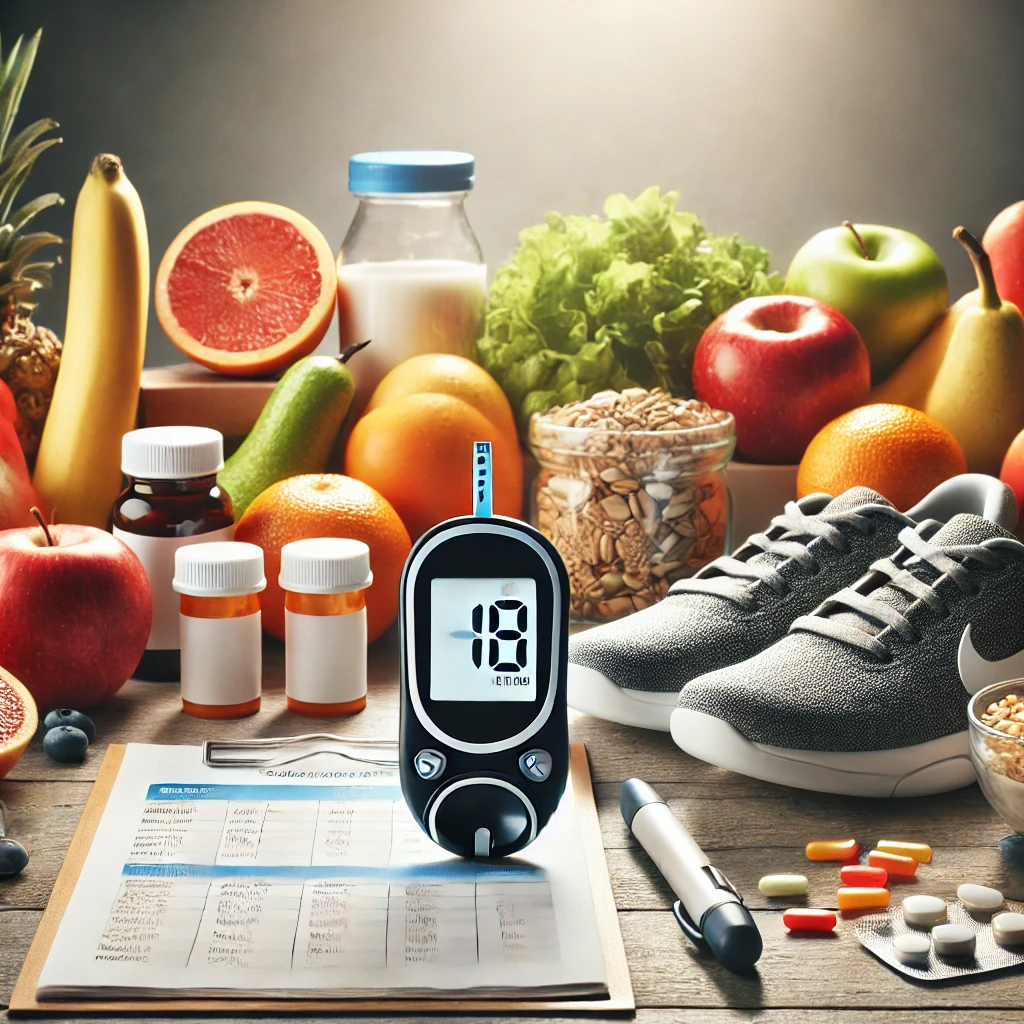Introduction
Diabetes is a chronic health condition that affects millions of people worldwide. This complex disease, primarily categorized as Type 1, Type 2, or Gestational Diabetes, disrupts how the body regulates blood glucose (or blood sugar). When left unmanaged, diabetes can lead to severe health complications, including heart disease, kidney damage, and neuropathy. Understanding the symptoms, management strategies, and preventive measures for diabetes is crucial in reducing its impact.

Types of Diabetes
- Type 1 Diabetes
- Cause: An autoimmune response in which the body’s immune system mistakenly attacks insulin-producing cells in the pancreas.
- Characteristics: Patients produce little to no insulin, requiring daily injections to manage blood glucose levels.
- Prevalence: Type 1 diabetes is generally diagnosed in childhood or adolescence, though adults can develop it as well.
- Type 2 Diabetes
- Cause: Often linked to genetics, lifestyle factors, and excess weight, this type results from the body’s inability to use insulin effectively (insulin resistance).
- Characteristics: It can be managed through lifestyle changes, medication, and sometimes insulin therapy.
- Prevalence: Type 2 diabetes accounts for the majority of diabetes cases and is more common in adults but is increasingly seen in younger populations due to lifestyle factors.
- Gestational Diabetes
- Cause: Occurs during pregnancy when hormones make cells more resistant to insulin.
- Characteristics: It usually resolves after pregnancy, but it increases the risk of Type 2 diabetes later in life.
- Prevalence: Affects a significant percentage of pregnant women and requires monitoring to avoid complications for both mother and baby.
Symptoms of Diabetes
Recognizing symptoms early can be crucial for timely intervention:
- Frequent urination: The body attempts to rid itself of excess glucose through urine.
- Excessive thirst: A result of dehydration from frequent urination.
- Unexplained weight loss: Particularly common in Type 1 diabetes, where the body breaks down fat and muscle for energy.
- Fatigue: High blood sugar levels impair the body’s ability to use glucose effectively, leading to low energy.
- Blurred vision: Due to swelling in the eye lens from fluctuating glucose levels.
- Slow healing: High glucose can impair blood circulation, affecting the body’s ability to heal wounds.
Managing Diabetes
Diabetes management involves a combination of lifestyle modifications, medication, and regular monitoring. Here are the core elements of diabetes management:
- Diet and Nutrition
- A balanced diet rich in fiber, whole grains, lean protein, and healthy fats can help regulate blood glucose. Carbohydrate counting and portion control are essential for people with diabetes.
- Exercise
- Physical activity helps improve insulin sensitivity, aiding glucose absorption into cells. Regular activities such as walking, cycling, and strength training can have a significant positive effect.
- Medication and Insulin
- While lifestyle changes are critical, medication is often necessary. Type 1 diabetes patients need insulin, while Type 2 patients may require oral medications or insulin based on the progression of the disease.
- Monitoring Blood Glucose Levels
- Regular monitoring provides insight into how lifestyle choices affect blood sugar levels, helping in medication adjustments and dietary decisions.
- Stress Management
- Stress can increase blood sugar levels and impact overall health. Techniques like mindfulness, yoga, and breathing exercises can help lower stress and improve diabetes outcomes.
Preventing Type 2 Diabetes
While Type 1 diabetes cannot currently be prevented, lifestyle choices can significantly reduce the risk of developing Type 2 diabetes. Here are some prevention tips:
- Maintain a Healthy Weight: Obesity is a primary risk factor; losing even a small amount of weight can reduce risk.
- Exercise Regularly: Aim for at least 150 minutes of moderate exercise each week.
- Eat a Balanced Diet: Limiting refined carbs and sugar can prevent insulin resistance.
- Avoid Tobacco and Limit Alcohol: Both can contribute to complications and increase risk factors for Type 2 diabetes.
Conclusion
Diabetes is a challenging yet manageable condition with the right information and lifestyle changes. Awareness, early detection, and proactive management are essential in mitigating the risks and enjoying a healthy, active life. As research continues to advance, those living with diabetes and those at risk can look forward to improved treatments and possible preventive strategies in the future.
